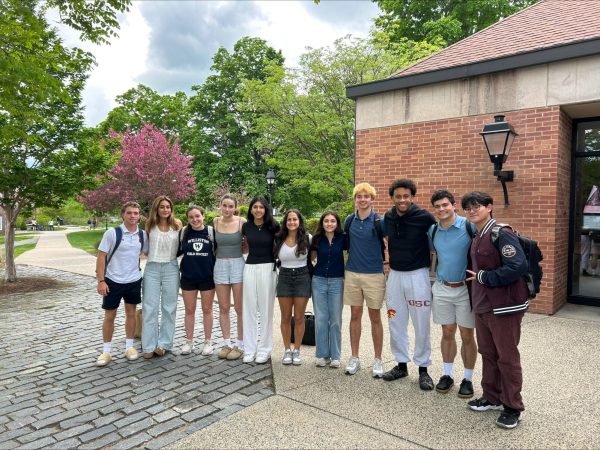Rethinking Studying Abroad
Shrines and memorials for the victims of the November Paris attacks.
Students and parents are rethinking the safety of study abroad programs as a result of terrorism in Paris and fatal bus accident in Honduras. Some students have left their program early or decided not to go at all in the last few months, but many students are not deterred to travel because of world events.
The number of U.S. students traveling abroad has more than tripled over the past twenty years. The most popular destination is the United Kingdom, followed by Italy, Spain, France, and China, according to an article in The Boston Globe by Peter Schworm.
Studying abroad is a valuable part of some students’ education, but after the attacks in Paris in November, many students returned home early. Mostly, parents are concerned for the safety of their children and want them to come home.
A recent Willistonian survey showed that 77% of students who answered said that they would like to travel to Europe despite the recent terrorist attacks.
A few students reported they are nervous to travel to Europe, but mostly students are even more motivated to study abroad, to show the terrorists that they are not afraid.
“Groups like ISIS want to scare people and disrupt their daily lives,” says Williston Senior Teddy Wolfe. “I won’t let them do that. I will go to Europe/abroad, if I can afford or organize it, in college because I’ve always wanted to.”
Also, most students feel that there is not much of a difference between the danger in Europe and in the United States.
A Williston student who has chosen to remain anonymous notes, “I don’t think that [the Paris attacks] made Europe any more dangerous overall. 9/11 didn’t make the US a more dangerous place to go to. People are still visiting and immigrating all the time. At the moment, I don’t think we should be treating Europe any different.”
Kira Wilson ’16 spent her junior year in France. She loved it and notes that it was “one of the best things I’ve ever done.”
She was in France when the Charlie Hebdo massacre happened, but she was not living in Paris. She thought it was scary, but Wilson never considered coming home. She notes, “The bombings in Boston had happened the year before, and Boston isn’t any further from home than Paris was.”
Wilson’s parents supported her going to France, and 73% of Williston students who participated in the recent Willistonian survey said their parents supported studying abroad.
Alysha Romain, sister of Natalie Romain ’18, spent her fall semester of college in France. She went to the Stoneleigh-Burnham School, and now she is a junior at Connecticut College. For her double major of International Relations and French, studying abroad is essential, she said.
Romain was in Paris during the November attacks. “It took me a while to process what had actually just happened, it was very surreal,” Romain commented. “I always watched news coverage of attacks happening in countries thousands of miles away, but for me there was a terrorist attack right in my backyard.”
Romain was safe but notes, “A few of the students in my program were actually at the Stade de France that night and had to be evacuated, so their experiences were a lot different from mine. Also, a guy in my program was at a bar near one of the shooting sites and was held there for hours.”
After the attacks, about half of Romain’s Conn classmates left Paris.
In terms of safety, Romain explained, “My program was extremely proactive in making sure we were all safe; the faculty had called all of us to make sure we were safe and also sent us emails updating us all weekend and making sure that we were safe inside.”
The students were given clear instructions. One email from her program read: “We ask you not to go to a café or a restaurant, not to go to the movies or to the theater, not to go to a museum or a tourist site, not to go to the Champs Elysées, not to go to a concert or an opera/ballet, and to avoid train stations and large metro stations.”
In this state of emergency, Romain never considered returning home. She did not think another huge attack would happen. She loved Paris and did not want to let the attacks ruin her semester.
Despite being so close to the Paris attacks, Romain thinks that France is a safer place than the United States, mostly because of strict gun control laws. She believes studying abroad in Europe is safe, and it is just like being in any big city.
This March break, Mr. Ryan Tyree and his wife were planning to take students on a trip to Europe, touring the Swiss and Italian Alps, and staying Geneva, Milan and Venice. However, this year a group is not going. Mr. Tyree says the trip was cancelled because students were slow to commit and send in deposits.
The Tyrees, who have led seven successful trips to Europe, have never experienced any safety problems while travelling to Europe.
Mr. Tyree notes, “We always have a moment or two on each trip where we have to adapt, make a concession, or resolve some sort of issue, but we’ve never had an experience that adversely affected the trip or [I hope] the students’ experience.”
This January, twenty-eight Columbia University students were riding a bus in Honduras, when it crashed, killing three students. The students were spending their winter break helping doctors and providing basic medical care in the second-poorest country of Latin America. This accident abroad was the result of faulty automobiles, poor road conditions and unenforced traffic laws, not terrorists.
Some parents want universities to keep track of fatalities that occur while studying abroad.
According to The New York Times’s article “Death of 3 Columbia Students Raises Fear over Trips Abroad,” “Some parents of students who have died on study abroad programs want universities to be forced to report the number of deaths or injuries on these trips. Ros Thackurdeen and Elizabeth Brenner, whose sons died on study abroad trips, hope that Congress will pass a law requiring universities to disclose this information, just as they are required to disclose data about crime on campus.”
Although studying abroad has risks, such as terrorism and other causes, it is worth it, says Wilson and Romain. There is terrorism and danger everywhere, and despite this threat, students are still enthusiastic about studying abroad, according to the Willistonian survey as well as Wilson and Romain.
Romain notes, “I’ve gained so much independence and valuable skills living in a big city.”
Wilson adds, “I think it is a great opportunity to learn more about the world from a different perspective. Being in such a new environment can teach you not only about the rest of the world, it can change your perception of where you came from. I learned so much from it, that I can’t imagine letting anyone, even a terrorist, try to take that from me.”
Sophia is a six-year senior from Northampton, MA. She likes to play lacrosse and talk to her sister in a funny voice.








